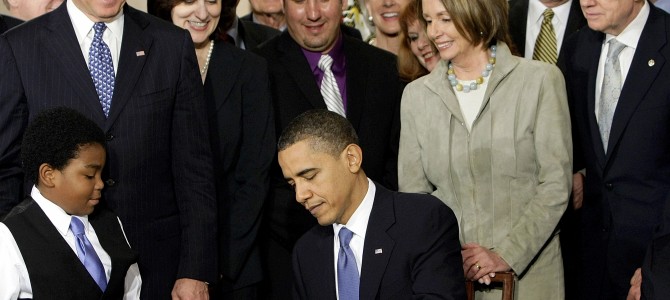
A federal judge in Texas has brought long-overdue clarity to our interminable debate over health care reform. On Friday, District Judge Reed O’Connor struck down Obamacare in its entirety, arguing that the individual mandate—the part of the law that forces American to buy insurance or pay a penalty—is unconstitutional. Because O’Connor ruled that the mandate can’t be separated from the rest of the health care law, he invalidated the whole thing.
It’s about time. No serious person has ever doubted that the individual mandate was unconstitutional, because no possible reading of the Commerce Clause could support such an outlandish scheme. As the late Justice Antonin Scalia noted during oral arguments before the Supreme Court in 2012, if the government can force you to buy health insurance under the Commerce Clause, it can also force you to buy broccoli, or a car, or pretty much anything. Allowing the individual mandate under the Commerce Clause powers would give Congress unlimited authority to regulate almost every aspect of our lives.
In his majority opinion for that case, Supreme Court Chief Justice John Roberts declared rather straightforwardly that, “The Federal Government does not have the power to order people to buy health insurance.” But then Roberts did something not straightforward at all. He construed the penalty—the Orwellian-sounding “shared responsibility payment”—as merely a tax, and therefore permissible under the federal government’s taxing power. By this rather crude rhetorical legerdemain, Obamacare survived.
Of course, the individual mandate penalty was never a tax, and everyone knows it. When Congress passed last year’s tax bill, it set the penalty to zero, beginning next year. That one move exposed the cynical heart of Obamacare for what it is. If there is no penalty, and no revenue being brought in for the federal government, then the penalty isn’t a tax. And because the individual mandate violates Congress’ authority under the Commerce Clause, the mandate must be struck down, along with the rest of the law.
Obamacare Failed Because Young People Didn’t Want To Pay For It
All of this underscores the blunt reality that Obamacare was always at heart a bad-faith proposition. The basic operation of the law, never stated or acknowledged by its authors, was to force younger, healthier people to subsidize health insurance for older, sicker people. It was a redistribution scheme, plain and simple.
Perhaps that’s a sound policy, maybe even a morally upright one. But that was never what Obamacare defenders claimed the law to be. They said it was a “market-based” reform, that it would foster competition and lower prices, that you could keep your plan and your doctor, that the average family would save $2,500 a year.
None of it was true. When health insurance premiums began skyrocketing and millions of Americans lost their coverage because insurance companies began canceling plans, the law’s faults, contradictions, and basic unfairness became obvious. Obamacare’s defenders were at pains to refute claims that the law was fundamentally redistributive or that it represented a federal takeover of individual insurance markets—indeed, that its rules about preexisting conditions represented a radical redefinition of health insurance itself.
Democrats tried to argue that the law wasn’t working properly because Republican governors and state houses weren’t cooperating: they refused to expand Medicaid or set up exchanges or train bureaucrats to help people navigate the byzantine mechanisms to buy Obamacare-compliant plans.
All along, everyone knew the real reason the law wasn’t working was because not enough young people were signing up. Instead of buying expensive and overstuffed health insurance plans, they were opting to pay the much cheaper penalty for skipping coverage altogether. At the time, health policy wonks on the left noted that the law would only work if the penalties were more punitive. Unless it cost more to not have insurance than to buy an Obamacare plan, why would otherwise healthy young people spend upwards of $1,000 a month or more on coverage they were unlikely to use?
They wouldn’t, and they didn’t, and the trend of people forgoing health insurance is no longer limited to young people. A growing number of Americans who don’t get insurance through an employer are simply going without it.
Enough With The Health Care Sleight-of-hand
Roberts might have saved Obamacare in 2012, but he couldn’t save the unpopular law from itself. Ordinary Americans knew the mandate penalty wasn’t a tax, it was exactly what it appeared to be: a punishment for not following orders.
The entire Obamacare ordeal has been marked by this kind of false dealing and cynicism. Who can forget the videos of Obamacare architect Jonathan Gruber, sneering and boasting about how “the lack of transparency is a huge political advantage” and that “the stupidity of the American voter… was really, really critical for the thing to pass.”
Or recall the seemingly more high-minded liberals like Jonathan Chait, who argued that “Obama’s reforms would save the average family $2,500 compared to what would happen if his reforms were not enacted.” Ordinary Americans, you see, just don’t know how bad it would have been without Obamacare, therefore when Obama said the average family would save $2,500 on premiums, he didn’t lie.
It went on and on like this for years, and it will likely continue for years to come, as Judge O’Connor’s ruling is appealed and Congress wrestles with what comes next. But here’s a bit of advice for federal lawmakers the next time they tackle health-care reform: if you’re going to force us to buy broccoli, at least have the decency to admit it.









